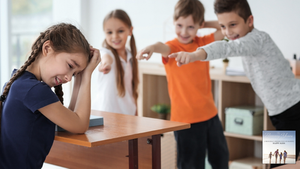
The value of spending time and having fun with your child
With no expectation placed on you other than enjoying each other’s company, having fun with your child is all about finding quality time that is a such a precious and valuable way of building lasting and healthy relationships.

Speaking well to children
What we say and how we say it has such an impact on our child. Consider the following thoughts about the positive impact speaking well has on your child.

Encourage creativity in our children
Creativity is intelligence having fun. Read on to see how creativity can be a major driving force of learning for your child.

Enjoyable reasons to rest and celebrate family after Christmas:
After a bustling year and festive celebrations, now it’s time to savour the leisurely days of summer with your family. Read on for inspiring ideas to enrich those family experiences.

Let’s bring the warmth of Christmas into our family
Keep the Christmas spirit alive in the family. Explore unique ideas within these reflections to find out how.

Christmas Home Decorations - Rituals And Happy Memories
The home environment takes on a special magic for your child. Here are some thoughts about how your efforts in decorating for Christmas can have long-term value and memory-making moments for your children.

Why formal education is so important
From time to time people come up with the argument that formal school does not have value and that education at home could be adequate. Here are 8 reasons why formal education is essential for children.

Worthwhile thoughts to give our children as we approach Christmas.
It’s essential and memory-making to create family traditions at Christmas and focus on what matters.

Managing anger around children.
It’s a natural part of life to feel anger. We need to understand that a child can often misinterpret our anger and will often take on much of the blame when we have a meltdown. Managing our anger around children is the best way to ensure your feelings do not overpower your child. Our angry outbursts can sometimes lead them to shut down and to avoid being in our presence.
Read on for some thoughts on how your anger can influence your child.

Be a little on the wild side and explore adventure with your child
Don't underestimate that what you expose your children to can have a fantastic impact on their intellectual and emotional growth. Read here to consider ideas and examples of how you can make a to your child’s life by being open to many ideas.

Teach your child to have a go and to be a risk taker
I know it’s hard if there are risks, but, teach your child to have a go and to be a risk-taker. Read on for some advantages of this.

Managing anger in children
It’s natural for children to feel angry on occasion. Here are some tips to help manage this.

A few good tips when managing your child.
We are all learning how to parent daily. It keeps evolving as new experiences come our way. Nothing is constant as our children develop and change over the years. Read on for some reflections on what works well when engaging with your child.

Teaching good manners is a great life skill
Here are 5 benefits of teaching children great manners.

A happy child makes us all feel the joy of youth.
Read on for 5 basic needs to help your child feel content.

Be a proactive parent
6 parenting tips to being a proactive parent to steer the ship before it hits rough waters.

Helping your child with bullying matters
Is your child facing a bully at school or in other social settings? Read on for some sound strategies.

Six important parenting practices with an upbeat approach
Read on for 6 parenting tips to be more positive by involving children, and lightening the idea of control and discipline.

Teach your child to overcome safe comfort zones
Read here for six simple ways to inspire your child to step outside their comfort zone.

Children: Dealing with traumatic war news stories
Children can easily feel distress and confusion and have a sense of hopelessness when they see some of the graphic scenes of people and children suffering. It is important to be on the same page as their teachers when explaining war to your children.